LAWN& GARDEN RETAILER HEADLINES
Home Depot, Inc. Offers Nursery Certification Program to Employees
In an effort to increase sales and enhance customer service, Home Depot is providing nursery certification classes for all its employees. “This is all about sales and the customer,” said Bob Jacobson, Home Depot’s senior director for live goods, in a news article from Reuters.
Home Depot’s nursery training program was developed with the University of Georgia’s agricultural college and Macquarium Intelligent Communications. The gardening program requires workers to take and pass eight two-hour interactive classes. The computer classes educate store employees on garden topics such as plant diseases, insect control and landscaping design.
According to the National Gardening Association, gardening is a growing U.S. pastime. Lawn and garden sales rose from $30.2 billion in 1998 to $38.4 billion in 2003. U.S. consumers on average spent $457 per household on their lawns and gardens last year. Therefore, Home Depot is taking that information and running with it.
Many of the independent garden centers are known for their customer service. Much of that service includes plant and insect diagnostics and landscape design. At this point Home Depot is adding this service to better assist its customers much like the independents do. Employees who complete the training are given patches to wear that identify them as certified nursery consultants. The company has more than 35,000 lawn and garden workers. Of these, more than 1,700 employees have already been certified since classes began in February 2004.
Sudden Oak Death Hits with a Vengeance
Since the announcement of the 2004 P. ramorum, commonly called Sudden Oak Death (SOD), outbreak in California in mid-March, there has been new information flowing in every week about the disease and what is going on throughout the country. To date, the only reported cases have been in nursery stock. Here is some information that will hopefully help determine what needs to be done to make sure this disease does not hit you.
On March 12, 2004, Monrovia Nursery in Azusa, Calif., made the announcement that P. ramorum was present at that facility on a number of camellias. Infected plants were also found at Specialty Plants, Inc. in San Marcos, Calif.
According to Claude Knighten, SOD spokesperson for APHIS, “To date, we know that the pathogen is known to affect 59 hosts and associated hosts [of nursery stock]. As information becomes available we will update it.” For a complete list of the plants regulated and associated with P. ramorum, go to www.aphis.usda.gov/ppq/ispm/sod.
As of press time, there have been no reports on any plants including annuals, perennials, greenhouse vegetables and fruits.
APHIS began regulating the interstate movement of SOD host and associated host plants. As of March 26, 2004, APHIS quarantined all California nurseries producing P. ramorum hosts and associated hosts. According to the quarantine, no California host or associated host plant material will leave the state without being certified as complying with the quarantine. In order to be certified for shipment, plants are subjected to intensive visual inspections and diagnostic testing. Diagnostic samples will be processed through a network of approved federal, state and university laboratories.
On April 22, APHIS issued an order restricting the movement of nursery stock from California nurseries, amended from an order issued April 9, following extensive negotiations between federal and state plant protection officials.
In order to prevent the spreading of SOD, APHIS established restrictions on the interstate movement of nursery stock that has been identified as a host or associated host from commercial nurseries in 46 non-quarantined counties in California until the nursery has been inspected and determined by USDA diagnostics to show no evidence of SOD infestation. The 10 counties currently under quarantine are Alameda, Marin, Mendocino, Monterey, Napa, San Mateo, Santa Clara, Santa Cruz, Solano and Sonoma. The amended order adds Contra Costa and Humboldt to the list of quarantined areas.
According to Claude Knighten, media contact for APHIS and the SOD hotline, there are two separate quarantines. APHIS is regulating hosts and associated hosts of P. ramorum from the 46 non-quarantined counties. From the 12 quarantined areas, APHIS is regulating other material, such as soil and wood items. Hosts and associated articles inspected, tested and determined to be negative for SOD using both PCR and culture/morphological protocols prior to April 23, 2004 are eligible for interstate movement, provided that the nursery is operating under a compliance agreement with APHIS. All nursery stock and associated articles shipped interstate from California must be accompanied by appropriate federal certification issued under a compliance agreement.
According to ANLA the analysis of the USDA-APHIS order, the amended order ensures that all California nurseries shipping known SOD hosts and associated plants interstate are subject to inspection and diagnostic testing prior to shipment. It also places temporary holds on all hosts; associated plants; plants located within a 10-meter radius of hosts and associated plants; and all plants within host and associated plant genera, pending inspection and testing. The order establishes the parameters for testing, including which types of diagnostic tests APHIS will use and the response to either positive or negative test results.
According to the order, a minimum of 40 samples must be tested per nursery location. One sample may contain more than one leaf, but no more than one sample per plant can be taken. According to the USDA, “Samples will be taken from symptomatic plants unless no symptomatic plants are present. In that case, asymptomatic plants will be sampled. Sampling shall be biased to hosts, associated articles and nearby plants.”
According to Knighten, the most current list of states that have imposed restrictions on SOD are: Alabama, Arkansas, Delaware, Florida, Georgia, Indiana, Kentucky, Louisiana, Mississippi, Montana, Oregon, Tennessee, Utah, Washington and West Virginia. Each state has its own quarantine restrictions. It is also reported that Canada is holding some quarantine restrictions for the disease.
According to the SOD quarantine regulation guidelines, all plants and plant material found to be susceptible to the disease will be quarantined. This includes nursery stock, logs, lumber, bark chips, mulch, firewood, sawdust and other plant products that may contain pieces of bark or are constructed from pieces of bark and associated soil.
As of press time, USDA has placed a hold on 189,519 plants (not including the thousands of plants being held by Monrovia at its Azusa, Calif., facility) in the 39 states that have received suspect plant material, according to Knighten. At this time Knighten said that of the 39 states, the following have test positive for P. ramorum: California, Louisiana, Oregon, Washington, Florida, New Mexico, Tennessee, Georgia, North Carolina, Virginia, Colorado and Texas.
As of April 13, 2004, Monrovia received notification from the California Department of Food and Agriculture (CDFA) that all samples collected at the company’s Visalia, Calif., nursery on March 22 tested negative for the plant pathogen. According to Monrovia, the USDA issued a compliance agreement that allows interstate shipment of SOD-regulated hosts and associated host plants from this facility. As a precaution, Monrovia has kept camellias at the Visalia nursery on hold for several months of retesting.
As of March 30, 2004, Hines Horticulture, Inc. also announced that all of its California nursery growing facilities have tested free of P. ramorum. On March 19, the company allowed a voluntary suspension of SOD host and associated host plant shipments as a precautionary measure, even though none of its nurseries tested positive.
The USDA has been seeking emergency funding of at least $40 million for quarantine efforts, trace-forwards and trace-backs of suspect plant material, and an aggressive national survey. The survey will focus on both nurseries and targeted natural area sites. According to the April 1 USDA pest managers report, the federal government has provided $7.4 million in funding for 2004.
Roark Capital Group Acquires Interest in Pike Family Nurseries
Roark Capital Group, an Atlanta-based equity firm, announced it has acquired a majority interest in Pike Family Nurseries, the largest independent lawn and garden center in the Southeast and the third largest in the United States. Founded in 1958, Pike Family Nurseries has 26 locations in and around the Atlanta metro area.
“The Pike family has built the most recognized brand name in the fast-growing lawn and garden industry,” commented Neal Aronson, managing partner and founder of Roark. “With our investment, we are rallying behind Randy Pike to grow the store base and extend the Pike experience to new areas.”
“The Roark team is unique they understand and appreciate the essence of our brand, the loyalty of our customers and the solid growth opportunities available to us.,” said Randy Pike, Pike Family Nurseries CEO. “We’ve invited them into the Pike family and are excited to access their financial and operational expertise. ” “We see a great opportunity for Pike to continue playing a major role in the niche between big box retailers and mom and pop lawn and garden specialty stores,” commented Shawn Welch, lead partner at Roark Capital Group for the Pike relationship.
“I am excited to partner with Roark Capital Group,” added William “Pete” Pike, founder of Pike Family Nurseries. “Our loyal employees, customers and suppliers can rest assured that Pike Family Nurseries will continue to provide the highest quality products and services as we have for two generations.”
Pike is Roark Capital’s fourth acquisition of a multi-unit business and its third acquisition of an Atlanta-based company. In 2003, Roark Capital acquired FASTSIGNS Inc. a quick service sign company; Money Mailer LLC, a shared mail advertising company; and the Carvel Corporation a manufacturer of ice cream cakes and soft-serve ice cream.
Garden Home Collection expands
Armstrong Garden Centers, Bachman’s Floral Gift and Garden Centers and Welby Nurseries have joined The Flower Fields in offering P. Allen Smith’s Garden Home Collection, bringing the total number of independent garden centers to more than 200. The new partners expand the brand’s retailer base to California, Colorado, Minnesota and New Mexico.
The Flower Fields has taken over management of the program in order to expand beyond the regions Novalis could not cover. According to Donna Greenbush, media contact for The Flower Fields, “Novalis is now one of our grower retailers, just as Armstrong, Bachman’s and Welby are. Now, we are able to take this nationwide by offering it to other retailer groups. It’s a great network of growers to work with. “
Armstrong will offer the collection in all of its stores and plans to expand the program to additional retailers in California, Arizona and Nevada. Bachman’s is offering the collection in the company’s six stores in Minneapolis, Minn. Welby has picked up the program in more than 10 garden centers in Colorado and New Mexico. Each company grows, merchandises and delivers collection materials to its retailers, assuring premium quality for both plants and displays.
Novalis had charged a royalty rate for the use of benching for several years. Now, new retailers purchase the benching and keep the benching. They have three options under The Flower Fields management. They can choose a full bench, holding 1,008 plants; a half bench, holding 600 plants; or an end cap. “We’re not charging any sort of markup on the benches,” said Greenbush. “We want to improve on the benching, based on what growers have available to them, so that we can maintain the quality look.”
“After meeting with Allen and representatives from The Flower Fields, we saw the tremendous potential the collection offered,” said Gary Jones, marketing manager for Armstrong. “The concept of giving gardeners a color-coordinated collection, carefully pre-selected to mix and match with design success was great. Allen has a loyal following, and his extensive media presence allows him to demonstrate the type of success home gardeners will have using the collection plants and design principles.”
The collection, offered exclusively to independent garden centers, is named for its designer, gardening authority and media personality P. Allen Smith. Smith personally selects every plant, designated for sun and shade tolerance. The plants are displayed along with recipe cards with Smith’s personal advice for creating containers, beds and borders. Each plant is marked “tall and spiky,” “full and round” or “cascading,” making each recipe easy to follow.
“We have over 1,500 different varieties, so people can choose what works best for their region. P. Allen Smith has picked a color palette and made sure that with that color palette, there are all three different habits,” said Greenbush.
“I’m gratified that so many new garden centers have chosen to carry the collection,” said Smith. “I wanted to provide both plants and recipes to inspire today’s gardeners and boost sales for both retailers and their growers.
Significant enhancements to the program for 2004 under The Flower Fields new management include :
- Elimination of program fees.
- Retailer ownership of custom-made benching for the collection, which includes housing for dynamic large-scale graphics.
- Enhanced POP kit, including header panels that slip into benching, recipe cards for containers and borders, a recipe cardholder, ad slicks and a program binder.
- Optional supplementary marketing materials available from Sunrise Marketing.
- Options for personal appearances by P. Allen Smith.
For details on the plants and design principles of the collection, visit www.pallensmith.com. For information on becoming a grower/retailer in the program, visit www.theflowerfields.com or pallen.sunrisemarketing.com.






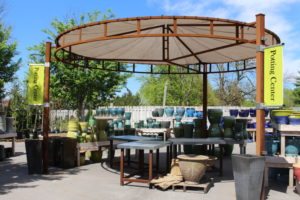
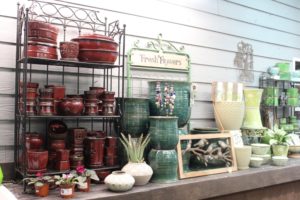
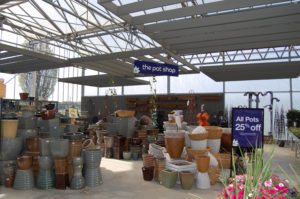
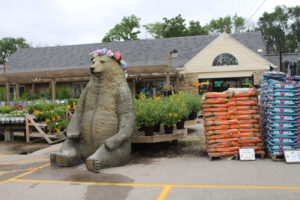
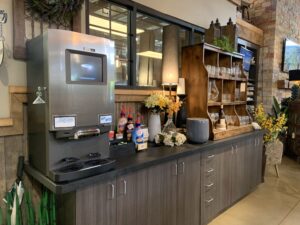
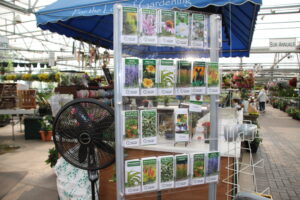
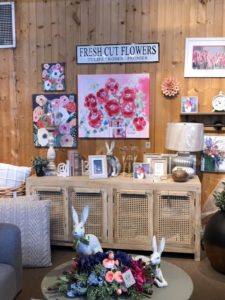
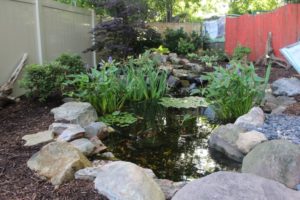
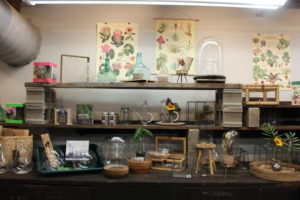
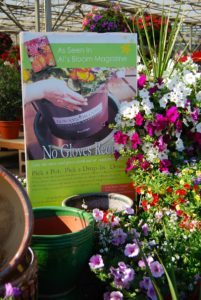
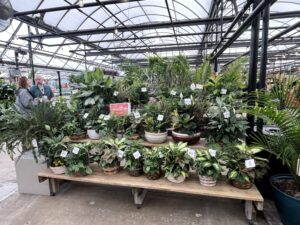
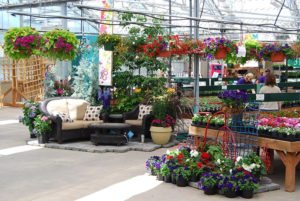
 Videos
Videos





